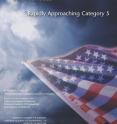ACS applauds new National Academy of Sciences report on education and scientific innovation
If America is to recover from years of severe job losses and financial crisis, the nation must stay the course of smart, sustained investments in our most valuable economic engine: scientific research and globally competitive education that together fuel technological innovation. So says a National Academy of Sciences report, Rising Above the Gathering Storm, Revisited, that was issued today.
"The Academy has taken a responsible position with long-term stability in mind," said American Chemical Society President Joseph S. Francisco, Ph.D. "In our current economic climate there isn't a simple or an immediate solution. I am proud to say that ACS continues to agree with the authors' recommendations for creating economic security and prosperity for Americans."
The importance of federal investments in scientific research, education on all levels, and technology was stressed in 2005 in the first iteration of the report, entitled Rising Above the Gathering Storm: Energizing and Employing America for a Brighter Economic Future.
"Five years ago, these authors provided foresight. Now, their vision answers a national imperative," Francisco said. "Their first report documented that we were losing our competitive edge compared to our global partners, and prescribed a path to develop our strongest potential. In 2010, the solution hasn't changed, but the need has. Our nation faces unprecedented budget deficits; more than ever we need to sustain investments in enterprises that yield long-term economic growth. In the United States, science and technology have a proven track record of creating broad-based prosperity."
To achieve this stability, the 2010 report makes four overarching recommendations and presents evidence to illustrate the need for these solutions:
- Move the United States' K-12 education system in science and mathematics to a leading position by global standards. Facts: Ninety-three percent of U.S. public school students in fifth through eighth grade are taught the physical sciences by a teacher without a degree or certificate in the physical sciences. Sixty-nine percent of these same students are taught mathematics by teachers without a degree or certificate in math.
- Double the real federal investment in basic research in mathematics, the physical sciences and engineering over the next seven years (while, at a minimum, maintaining the recently doubled real spending levels in the biosciences). Fact: Federal funding of research in the physical sciences as a fraction of Gross Domestic Product (GDP) fell by 54 percent in the 25 years after 1970. The decline in engineering funding was 51 percent. For the next five to seven years the United States, due to budget limitations, will only be able to send astronauts to the Space Station by purchasing rides on Russian rockets.
- Encourage more United States citizens to pursue careers in mathematics, science and engineering. Fact: In 2000, the number of foreign students studying the physical sciences and engineering in U.S. graduate schools for the first time surpassed the number of U.S. students. The United States ranks 27th among developed nations in the proportion of college students receiving undergraduate degrees in science or engineering.
- Rebuild the competitive ecosystem by introducing reforms in the nation's tax, patent, immigration and litigation policies. Fact: In the 2009 rankings of the Information Technology and Innovation Foundation, the United States was in sixth place in global innovation-based competitiveness, but ranked 40th in the rate of change over the past decade. Eight of the ten global companies with the largest R&D budgets have established R&D facilities in China, India, or both.
The report further advises that "substantial evidence continues to indicate that over the long-term the great majority of newly created jobs are the indirect or direct result of advancements in science and technology, making these and related disciplines … of disproportionate importance." In fact, investment in these disciplines leverages economic growth in very broad terms. The report explains it isn't simply the scientist, engineer and entrepreneur who benefit from progress in a laboratory or design center. It is also the factory worker who builds the item, the advertising firm that promotes the product, the truck driver who delivers the product, and the local government that benefits from the tax revenue. Further, these jobs generate, on average, another 2.5 jobs in service industries such as grocery stores, restaurants, banks and barber shops.
According to figures from the American Chemistry Council, over 96 percent of all manufactured goods are directly touched by the business of chemistry. Likewise, chemistry companies in the United States directly employ 849,000 people and indirectly contribute 4,678,200 jobs to the U.S. economy.
Since 2005, when the first report was released, key investments to stimulate American competitiveness in the sciences and technological innovation have been funded, but largely as either one-time actions, such as the American Recovery and Reinvestment Act, or as authorization of the America COMPETES Act, which is up for renewal in 2010.
"The issue at stake," says the report, "is whether funding to help assure that Americans can compete for quality jobs will be provided on a sustained basis. The budgetary pressures now faced by the nation make such investments extremely difficult; however, if not made, the future consequences in terms of unemployment and related costs will likely be immense."
"Now, more than ever, we must continue to fuel our nation's R&D infrastructure as it is the engine that produces innovative breakthroughs vital to our nation's prosperity," Francisco said. "This new report makes a compelling case for continuing investments. To do anything less invites great potential peril."
Source: American Chemical Society
Other sources
- U.S. Failure to Innovate Fuels Gathering Economic Stormfrom Live ScienceThu, 23 Sep 2010, 20:21:34 UTC
